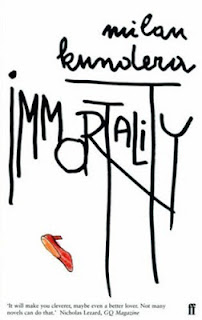Kundera is a master novelist. In my mind, few other writers take the novel as an art form to such depths. Basically, there are novels, and then there are Kundera novels.
His language so poetic, his words so perfectly woven together, his characters so complicated and knowable, his themes so deep that his novels defy analysis. As someone who writes essays on books, it’s a bit intimidating, like writing an essay on the Sistine Chapel. You’re fucked before your fingers even touch the keyboard.
But here I go anyway…
What is this book about? Art, specifically the art of the novel, erotica, how others will remember (or forget) us after we’re dead, suicide, Hemingway, and on and on. Kundera uses narrative elements (rising tension, interconnected story lines, character development, back story) but the end result is something I’m not sure I can call a “story.” It’s more of a discussion, a slip into some deep poetic trance. It’s a philosophical text without the bullshit academic ornamentation.
Speaking through one of his characters, Kundera offers some thoughts on the novel as a relevant art form. This quote, I believe, sums up what he is trying to do with Immortality: “The present era grabs everything that was ever written in order to transform it into films, TV programs, or cartoons. What is essential in a novel is precisely what can only be expressed in a novel, and so every adaptation contains nothing but the nonessential. If a person is still crazy enough to write novels nowadays and wants to protect them, he has to write them in such a way that they cannot be adapted, in other words, in such a way that they cannot be retold.”
If this was his goal, he achieved it masterfully. The end result is a novel that should silence all those poor, helpless souls who say things like “I just can’t get into novels... They’re just stories somebody made up... I only read nonfiction... blah, blah, blah...” Those ignorant fools who go through life missing out on humankind’s highest artistic heights are simply wrong, and this novel is proof.
Like another Kundera novel I’ve read and loved, The Unbearable Lightness of Being, Immortality is translated from Czech. I don’t know much about the Czech language or novel translation, but there’s something marvelous about Kundera’s native tongue when it is translated into English. Kundera’s description is full of intense emotion and power. Like this: “It is the most beautiful part of sleep, the most delightful moment of the day: thanks to the radio I can savor drowsing and waking, that marvelous swinging between wakefulness and sleep which in itself is enough to keep us from regretting our birth.” I too love that part of the day between sleep and wakefulness, so maybe that’s why this sentence stuck out to me. But Kundera is such a talented artist that he could write about hanging sheet rock and I’d love it.
This novel is also laugh-out-loud funny. In one scene Goethe and Hemingway (both dead and speaking together in some sort of anonymous afterlife) are having a conversation about their lives on earth. Goethe says: “To be mortal is the most basic human experience, and yet man has never been able to accept it, grasp it, and behave accordingly.” When Hemingway dissents, Goethe counters: “Don’t make a fool of yourself, Ernest… You know perfectly well that at this moment we are but a frivolous fantasy of a novelist who lets us say things we would probably never say on our own.” This is one of many examples of Kundera inserting himself into this novel. At times he refers to himself by name and uses his own first-person narration. This is very rare in literature, the novelistic equivalent of the Wizard of Oz voluntarily pulling up the curtain and introducing himself to Dorothy and her fellow travelers. Under most circumstances, this tactic would be distracting at best, but more likely iridiculous. Not with Kundera, of course. Somehow he pulls it off.
And then there are sentences like this: “I knew that if I didn’t go with him on his tire-slashing expedition he would never find anyone else and would remain isolated in his eccentricity as if in exile.” Wow. Who the fuck writes like this? No one but Kundera.
Kundera’s insight into love, sexuality and relationships is impressive. This man must’ve had quite the romantic life, or else an incredible imagination, or both. Regardless of his own between-the-sheets experiences, he really knows how to write hot sex. I’m just being honest: Kundera pulls off erotica with ease.
If you’ve read to this point, you still probably have no idea what the novel is “about.” I just finished it, and I can’t nail it down. It’s art, beautiful art. That’s all. Read it and tell me this man isn’t a genius.

No comments:
Post a Comment